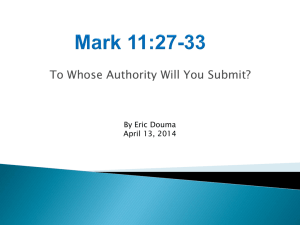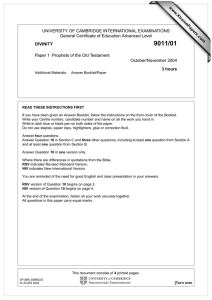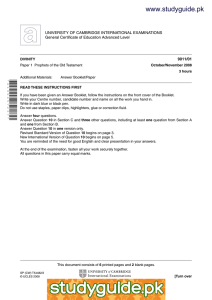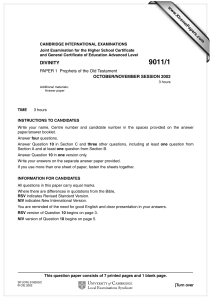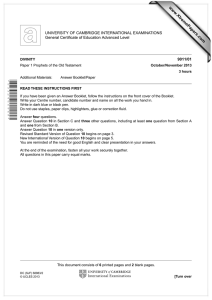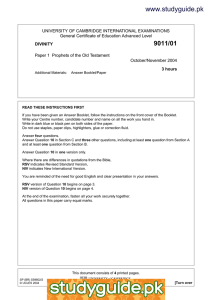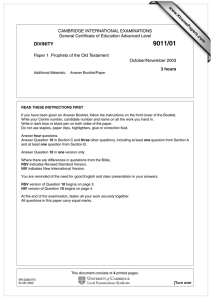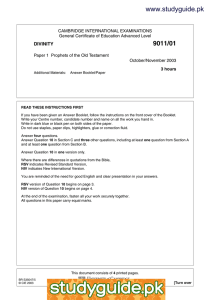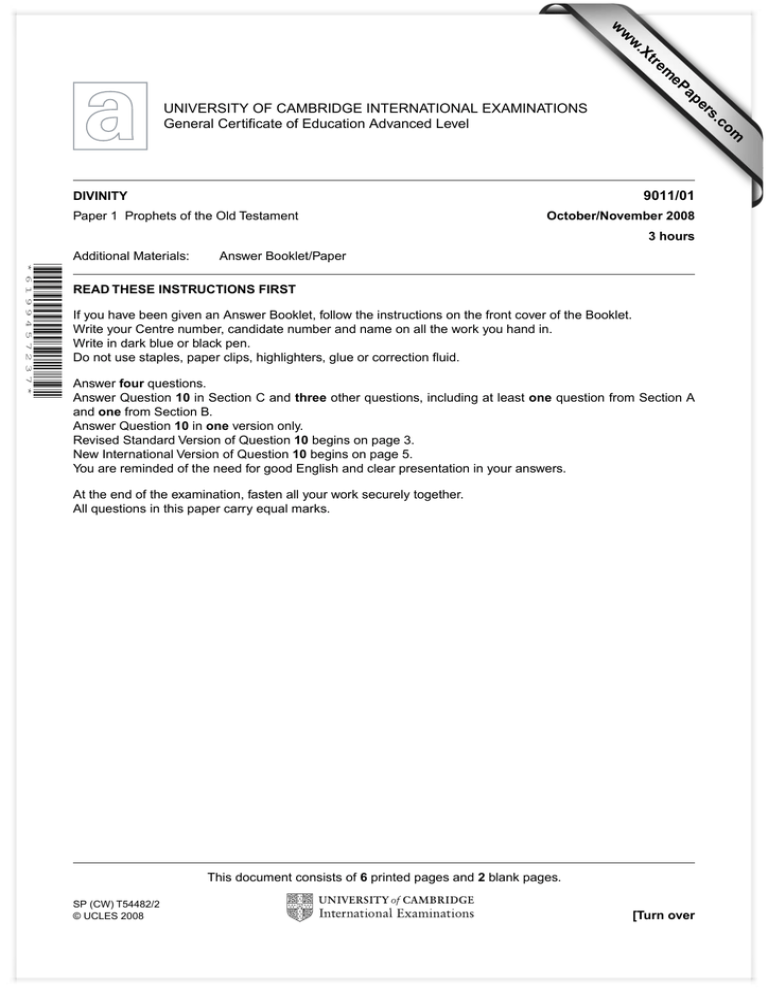
w
w
ap
eP
m
e
tr
.X
w
om
.c
s
er
UNIVERSITY OF CAMBRIDGE INTERNATIONAL EXAMINATIONS
General Certificate of Education Advanced Level
9011/01
DIVINITY
Paper 1 Prophets of the Old Testament
October/November 2008
3 hours
Additional Materials:
Answer Booklet/Paper
*6199457237*
READ THESE INSTRUCTIONS FIRST
If you have been given an Answer Booklet, follow the instructions on the front cover of the Booklet.
Write your Centre number, candidate number and name on all the work you hand in.
Write in dark blue or black pen.
Do not use staples, paper clips, highlighters, glue or correction fluid.
Answer four questions.
Answer Question 10 in Section C and three other questions, including at least one question from Section A
and one from Section B.
Answer Question 10 in one version only.
Revised Standard Version of Question 10 begins on page 3.
New International Version of Question 10 begins on page 5.
You are reminded of the need for good English and clear presentation in your answers.
At the end of the examination, fasten all your work securely together.
All questions in this paper carry equal marks.
This document consists of 6 printed pages and 2 blank pages.
SP (CW) T54482/2
© UCLES 2008
[Turn over
2
Section A
Prophecy in general, and Pre-canonical Prophets.
1
Consider the claim that the prophets always based their messages on those who went before
them.
2
‘The origins of Israelite prophecy can never be known.’ Discuss.
3
Assess the view that Samuel and Elijah were ideal prophets rather than real prophets.
4
‘False prophets were more successful than true ones.’ Discuss.
5
Assess the importance for the prophets of symbolic acts.
Section B
Pre-exilic Prophets, with special reference to Amos, Hosea, Isaiah of Jerusalem and Jeremiah.
6
In your view, what is the best interpretation of the message of Hosea 1–3?
7
Examine the main differences between the pre-exilic writing prophets and the prophets who came
before them.
8
Discuss the influence of Jeremiah’s call on his work and message.
9
In what ways do Amos and Isaiah make use of the concept of God’s absolute power?
© UCLES 2008
9011/01/O/N/08
3
Section C
Answer Question 10 in one version only.
REVISED STANDARD VERSION
10 Comment on points of interest or difficulty in four of the following passages (wherever possible
answers should refer to the context of the passage but should not retell the story from which the
passage is taken):
(a) … I will come down and talk with you there; and I will take some of the spirit which is upon you
and put it upon them; and they shall bear the burden of the people with you, that you may not
(Numbers 11:17)
bear it yourself alone.
(b) Saul answered, “Am I not a Benjaminite, from the least of the tribes of Israel? And is not my
family the humblest of all the families of the tribe of Benjamin? Why then have you spoken to
me in this way?”
(1 Samuel 9:21)
(c) The LORD has done to you as he spoke by me; for the LORD has torn the kingdom out of your
hand, and given it to your neighbour, David. Because you did not obey the voice of the LORD,
and did not carry out his fierce wrath against Amalek, therefore the LORD has done this thing
to you this day.
(1 Samuel 28:17–18)
(d) For three years Syria and Israel continued without war. But in the third year Jehoshaphat the
king of Judah came down to the king of Israel. And the king of Israel said to his servants, “Do
you know that Ramoth-gilead belongs to us, and we keep quiet and do not take it out of the
hand of the king of Syria?”
(1 Kings 22:1–3)
(e) “But you made the Nazirites drink wine,
and commanded the prophets,
saying, ‘You shall not prophesy.’
Behold, I will press you down in your place,
as a cart full of sheaves presses down.”
(f)
Then the LORD said to me,
“The end has come upon my people Israel;
I will never again pass by them.
The songs of the temple shall become wailings in that day,”
says the Lord GOD;
“the dead bodies shall be many;
in every place they shall be cast out in silence.”
(g) I will heal their faithlessness;
I will love them freely,
for my anger has turned from them.
I will be as the dew to Israel;
he shall blossom as the lily.
(h) Hear the word of the LORD,
you rulers of Sodom!
Give ear to the teaching of our God,
you people of Gomorrah!
“What to me is the multitude of your sacrifices?”
says the LORD.
© UCLES 2008
9011/01/O/N/08
(Amos 2:12–13)
(Amos 8:2b–3)
(Hosea 14:4–5a)
(Isaiah 1:10–11a)
[Turn over
4
(i)
(j)
Woe to those who go down to Egypt for help
and rely on horses,
who trust in chariots because they are many
and in horsemen because they are very strong,
but do not look to the Holy One of Israel
or consult the LORD!
(Isaiah 31:1)
“Behold, you trust in deceptive words to no avail. Will you steal, murder, commit adultery,
swear falsely, burn incense to Baal, and go after other gods that you have not known, and
then come and stand before me in this house, which is called by my name, and say, ‘We are
delivered!’ – only to go on doing all these abominations? Has this house, which is called by
my name, become a den of robbers in your eyes?”
(Jeremiah 7:8–11a)
(k) …behold, days are coming, says the LORD, when this place shall no more be called Topheth,
or the valley of the son of Hinnom, but the valley of Slaughter.
(Jeremiah 19:6)
© UCLES 2008
9011/01/O/N/08
5
NEW INTERNATIONAL VERSION
10 Comment on points of interest or difficulty in four of the following passages (wherever possible
answers should refer to the context of the passage but should not retell the story from which the
passage is taken):
(a) I will come down and speak with you there, and I will take of the Spirit that is on you and put
the Spirit on them. They will help you carry the burden of the people so that you will not have
to carry it alone.
(Numbers 11:17)
(b) Saul answered, “But am I not a Benjamite, from the smallest tribe of Israel, and is not my clan
the least of all the clans of the tribe of Benjamin? Why do you say such a thing to me?”
(1 Samuel 9:21)
(c) The LORD has done what he predicted through me. The LORD has torn the kingdom out of your
hands and given it to one of your neighbours – to David. Because you did not obey the LORD
or carry out his fierce wrath against the Amalekites, the LORD has done this to you today.
(1 Samuel 28:17–18)
(d) For three years there was no war between Aram and Israel. But in the third year Jehoshaphat
king of Judah went down to see the king of Israel. The king of Israel had said to his officials,
“Don’t you know that Ramoth Gilead belongs to us and yet we are doing nothing to retake it
from the king of Aram?”
(1 Kings 22:1–3)
(e) But you made the Nazirites drink wine
and commanded the prophets not to prophesy.
Now then, I will crush you
as a cart crushes when loaded with grain.
(f)
Then the LORD said to me, “The time is ripe for my people Israel; I will spare them no longer.”
“In that day,” declares the Sovereign LORD, “the songs in the temple will turn to wailing.
Many, many bodies – flung everywhere! Silence!”
(Amos 8:2b–3)
(g) I will heal their waywardness
and love them freely,
for my anger has turned away from them.
I will be like the dew to Israel;
he will blossom like a lily.
(h) Hear the word of the LORD
you rulers of Sodom;
listen to the law of our God,
you people of Gomorrah!
“The multitude of your sacrifices –
what are they to me?” says the LORD.
(i)
(Amos 2:12–13)
Woe to those who go down to Egypt for help,
who rely on horses,
who trust in the multitude of their chariots
and in the great strength of their horsemen,
but do not look to the Holy One of Israel,
or seek help from the LORD.
© UCLES 2008
9011/01/O/N/08
(Hosea 14:4–5a)
(Isaiah 1:10–11a)
(Isaiah 31:1)
[Turn over
6
(j)
But look, you are trusting in deceptive words that are worthless.
Will you steal and murder, commit adultery and perjury, burn incense to Baal and
follow other gods you have not known, and then come and stand before me in this house,
which bears my Name, and say, “We are safe” – safe to do all these detestable things? Has
this house, which bears my Name, become a den of robbers to you?
(Jeremiah 7:8–11a)
(k) So beware, the days are coming, declares the LORD, when people will no longer call this place
Topheth or the Valley of Ben Hinnom, but the Valley of Slaughter.
(Jeremiah 19:6)
© UCLES 2008
9011/01/O/N/08
7
BLANK PAGE
9011/01/O/N/08
8
BLANK PAGE
Copyright Acknowledgements:
Scripture quotations marked (RSV) are from the Revised Standard Version of the Bible, copyright © 1946, 1952 and 1971 by the Division of Christian Education
of the National Council of the Churches of Christ in the USA. Used by permission. All rights reserved.
Scripture quotations marked (NIV) are taken from the Holy Bible, New International Version®. NIV®. Copyright © 1973, 1978, 1984 by International Bible Society.
Used by permission. All rights reserved.
Permission to reproduce items where third-party owned material protected by copyright is included has been sought and cleared where possible. Every reasonable
effort has been made by the publisher (UCLES) to trace copyright holders, but if any items requiring clearance have unwittingly been included, the publisher will
be pleased to make amends at the earliest possible opportunity.
University of Cambridge International Examinations is part of the Cambridge Assessment Group. Cambridge Assessment is the brand name of University of
Cambridge Local Examinations Syndicate (UCLES), which is itself a department of the University of Cambridge.
9011/01/O/N/08



